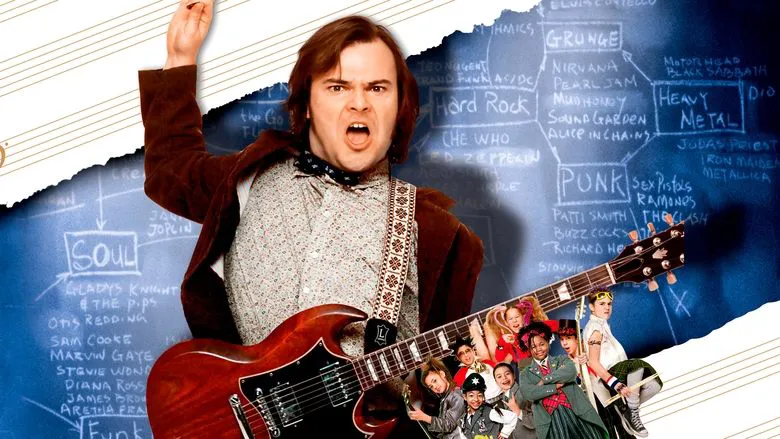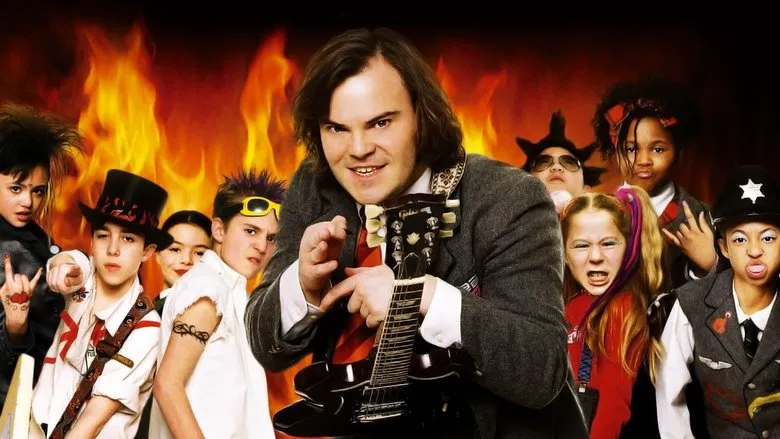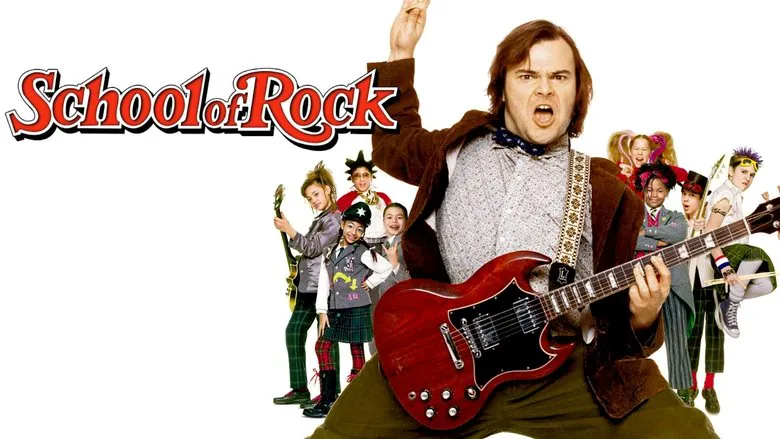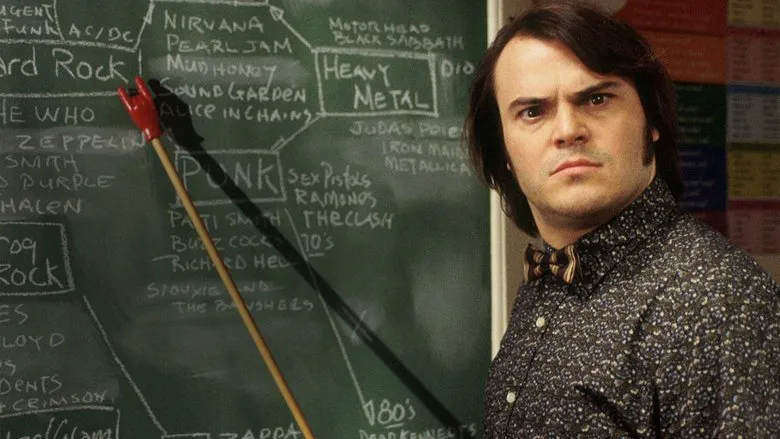From Rock ‘n’ Roll Rejects to Rockstar Teachers: A Lesson in Passion and Education
Have you ever felt the sting of unmet dreams? That feeling of reality not quite aligning with the visions you once held so dear? The movie “School of Rock” dives headfirst into this sentiment, personified by the character of Dewey Finn.

We find Dewey slumped and uninspired, a far cry from the rock god he aspires to be. Every moment feels like a countdown to a paycheck, a means to escape the charade he’s found himself in.

A Substitute Teacher Like No Other
The Unconventional Educator
Imagine the culture shock at a prestigious elementary school when Dewey Finn arrives as a substitute teacher.
This is no ordinary educator. Spelling seems optional to him, and his first priority is discovering who has snacks. He shamelessly devours a kid’s sandwich before collapsing in his chair, setting the stage for a truly unique teaching experience.
The ever-diligent valedictorian, embodying the spirit of eager learning, inquires, “Mr. Finn, what will we be learning today?”
Dewey’s blasé response? “No learning, no homework. Just go play.”
The student, representative of the school’s ambitious atmosphere, retorts, “Our parents pay a lot of money for us to be here. We’re not here to play.”

Dewey, rolling his eyes internally, laments his situation: “If I hadn’t been kicked out of my band and hounded for rent by my friend’s girlfriend, I wouldn’t be here pretending to teach a bunch of kids.”
And so, he continues to fidget, trapped in a role he never wanted.
Dewey Finn is a rock enthusiast, a dreamer, and a self-proclaimed failure recently ousted from his own band. He’s counting down the seconds until he can escape the confines of the school.
But fate intervenes when he overhears the students’ music class, sparking a rebellious idea: Why not start a band with them?
These kids possess classical instrument skills exceeding those of his former bandmates. With nothing to lose, Dewey decides to take a chance.
He transforms the classroom into a rehearsal space, assigning roles to each student.
The classical guitarist gets an electric guitar, unlocking a new dimension of sound.
The pianist trades the ivory keys for the rock and roll keyboard.
The cellist embraces the electric bass.
A student with no instrumental experience becomes the drummer, keeping the rhythm alive.
The driven valedictorian becomes the band manager, channeling their organizational skills.
The tech-savvy kid masters graphic design for the band.
And there’s even a backup vocal group, a security team, a fan club, and a costume designer. It’s a full-blown production!
To everyone’s surprise, the kids are naturals, embracing their newfound roles with passion.
They delve into rock theory and immerse themselves in the study of legendary rock bands. In this rock and roll environment, their skills rapidly grow.

Rock ‘n’ Roll Rebellion and the Power of Expression
Breaking the Rules with Music
Dewey, ever attuned to his students, notices some are disheartened. He overhears a stern father scolding his son: “Your only job is to study. No more rock music!”
Witnessing the boy’s crushed spirit, Dewey doesn’t offer hollow platitudes. Instead, he leads the band in an impromptu rock session, a powerful act of rebellion.
He explains that rock ‘n’ roll is about rebelling against the “man” in your life. To truly rock, you need the courage to break the rules.
He encourages the boy to express his suppressed emotions through screams and rock music, unleashing his inner vitality so that he feels empowered to defy.
Rebellion isn’t the goal; love is. This statement resonates with the core message of the film, which highlights the pursuit of passion and individual potential.
The boy later expresses his suppressed emotions and composes his own song. Dewey, impressed by his talent, shares it with the band, reinforcing the importance of validation and confidence-building.
Dewey’s most unique piece of advice comes through his guidance with the drummer that sports a rebellious mohawk that almost falls prey to the allure of adult rock stars. Dewey warns the drummer about the empty rock star souls and saves him from bad habits of smoking, drinking, and perms. He keeps it real and saves the drummer.

When the exceptionally talented but overweight singer hesitates, Dewey encourages her, too. “So what if you’re fat? I’m fat too!”
It’s a convincing argument, as Dewey is, in a way, unlike the typical rock star.
As he spends more time with the children, Dewey begins to feel a growing sense of responsibility. He is realizing a destiny of sorts and stepping into his future.
However, more and more parents discover their children listening to rock music at home and learn that the kids doing this for homework shocks the parents. The parents are enraged!

The parents are furious and demand a meeting.
At the meeting, Dewey’s deceptions catch up with him, and he reveals himself when discovered by his friend and then his friend’s girlfriend which then reports him to the authorities.
Before being escorted out, Dewey praises the children’s strengths to their parents and emphasizes that their children are vibrant, unique individuals.
But alas, Dewey’s words are lost as he’s dragged away while fueling the parents’ anger.
His response makes them even angrier. “We pay for our children to learn the traditional way!”
But is textbook knowledge the only form of learning?